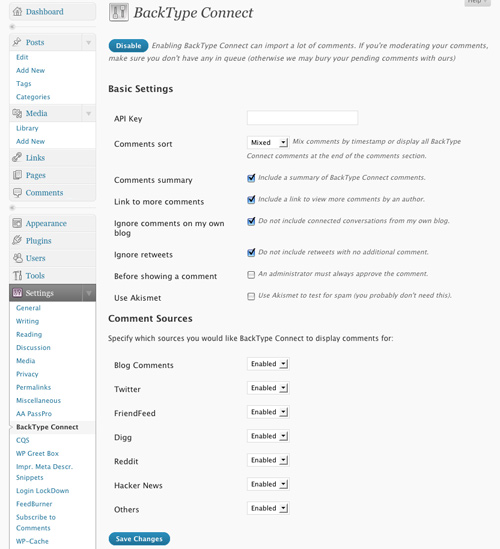BackType is aiming to solve a long-standing problem that reared its face when blogs met new forms social media and news sites. The problem I'm referring to is comment separation anxiety. Comments have feelings too. They don't like being separated. BackType's Connect WordPress plugin uses their Connect API to suck in all comments related to your blog post, whether they're on Twitter, FriendFeed, Digg, Reddit, Hacker News and more. The end result is one big conversation on your blog post. Comments are stored in your WordPress database too, so there's no worrying about some remote service having downtime and your blog not displaying all comments.
 BackType Connect Plugin settings
BackType Connect Plugin settings
The plugin has some basic settings right now. Things like selecting which sources you want comments to come from. For example, you might — with good reason — not want your blog to display comments from Digg. Then you can select if you'd like comments to be sorted according to their timestamp, or just have all external comments posted after your regular comments. Each new comment BackType brings in receives a small "This comment was originally posted on Hacker News" type banner to let readers know its origins.
However, in this age of threaded comments, BackType Connect seems to break some of the immediate cognition that comes with threaded comment layouts. That being said, BackType Connect is brand new and has much development ahead of it. For example, the plugin only goes back through posts from 2009 as BackType didn't start indexing FriendFeed and Twitter until then. Regardless, it's definitely promising and I'm looking forward to what it will become.
BackType was a Summer '08 Y Combinator startup that recently raised 300k from True Ventures, which has some ties to Automattic, so that might have something to do with BackType's interest in developing a WordPress plugin. You can read up more on what BackType is and follow my comments on my BackType account.
To see example BackType Connect WP integration, click through from your RSS reader.
What do you think of bringing in commentary from various sources regarding the same article? Does it dilute the conversation or unify it and make it easier to follow?